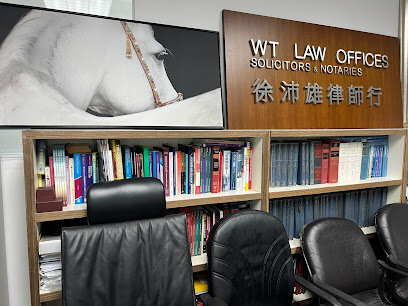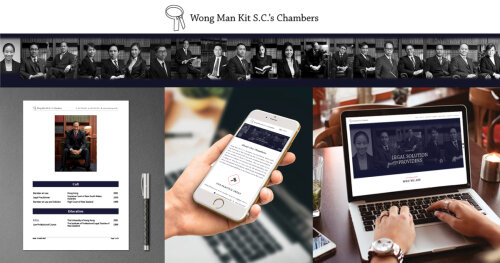Best Faith-Based Law Lawyers in Hong Kong
Share your needs with us, get contacted by law firms.
Free. Takes 2 min.
Or refine your search by selecting a city:
List of the best lawyers in Hong Kong
About Faith-Based Law in Hong Kong
Faith-Based Law in Hong Kong encompasses a wide array of religious laws and ethical guidelines that various religious communities may follow. It is crucial to understand that in Hong Kong, while religious freedom is constitutionally protected, religious laws do not override or substitute state laws. Many religious groups may have internal systems for resolving disputes or ensuring compliance with religious principles, but these are typically separate from civil or criminal proceedings recognized by the state. Faith-Based Law primarily interacts with family law, charitable activities, and religious commitments, which can necessitate specific legal advice or intervention when they intersect with Hong Kong's secular laws.
Why You May Need a Lawyer
Individuals may require legal help in Faith-Based Law for several reasons. These can include navigating marriage and divorce in accordance with both religious and civil law, settling disputes within religious organizations, ensuring that charities comply with both religious and local regulations, and addressing issues of religious discrimination. Additionally, when religious observances conflict with professional or public duties, legal advice may help mediate a satisfactory resolution.
Local Laws Overview
Key local laws relevant to Faith-Based Law in Hong Kong include:
- Basic Law: Ensures freedom of religion and the protection of individuals to practice their faith in public and private.
- Marriage Ordinance: Recognizes religious marriage ceremonies but requires registration to be legally valid under civil law.
- Charities Ordinance: Governs the establishment and operation of religious charitable institutions, requiring compliance with financial and operational standards.
- Equal Opportunities Ordinances: Protects against discrimination on various grounds, including religious beliefs, in employment and other areas.
Frequently Asked Questions
1. What is the relationship between Faith-Based Law and civil law in Hong Kong?
Faith-Based Law operates within the scope of religious practice, while civil law is legally binding under the jurisdiction of Hong Kong's government. Religious laws can guide personal and community conduct, but civil law prevails in legal conflicts.
2. Can religious marriages be recognized legally?
Yes, religious marriages can be recognized legally, but they must be registered according to the Marriage Ordinance to be valid under Hong Kong law.
3. Are there specific legal protections for religious practices?
Yes, the Basic Law protects religious freedoms, allowing individuals and communities to practice their faith without interference, as long as they comply with public law and order.
4. How are disputes within a religious community resolved?
Many communities have internal dispute resolution mechanisms according to their Faith-Based Law. However, legal disputes impacting civil rights or property must be addressed through the legal system.
5. Can religious organizations engage in charitable activities?
Yes, religious organizations often engage in charitable work. They must comply with the Charities Ordinance to maintain legal and financial accountability.
6. Is workplace discrimination based on religion illegal?
Yes, Hong Kong's anti-discrimination laws, including the Equal Opportunities Ordinances, protect individuals from discrimination based on religion in the workplace and other areas.
7. Can religious dietary practices be legally enforced in public institutions?
While individuals have the right to follow religious dietary practices, enforcing such guidelines in public institutions depends on institutional policies and legal frameworks.
8. What should I do if my religious freedom is violated?
It would be advisable to seek legal counsel and potentially file a complaint with relevant authorities, such as the Equal Opportunities Commission.
9. Is religious education protected in Hong Kong?
Yes, religious education is generally protected, with parents having a degree of choice regarding religious instruction for their children, subject to compliance with educational standards.
10. How can religious beliefs impact legal contracts?
Legal contracts must comply with civil law, but parties can include clauses aligning with religious principles, as long as they do not contravene local laws.
Additional Resources
For further information and support, consider reaching out to:
- Hong Kong Christian Council: An organization offering guidance on Christian-based legal and social issues.
- The Law Society of Hong Kong: Can refer you to lawyers specializing in Faith-Based Law matters.
- Equal Opportunities Commission: Provides resources and support for issues related to religious discrimination.
- Department of Justice, Hong Kong: Offers official legal information and resources.
Next Steps
If you require legal assistance regarding Faith-Based Law, start by identifying your specific needs. Consider consulting with a lawyer who specializes in or has experience with Faith-Based Law. Contact the Law Society of Hong Kong for recommendations. Be prepared with relevant documents and a clear description of the issue to facilitate effective legal consultation. Additionally, engage with relevant community or religious organizations for support and guidance in navigating your legal concerns.
Lawzana helps you find the best lawyers and law firms in Hong Kong through a curated and pre-screened list of qualified legal professionals. Our platform offers rankings and detailed profiles of attorneys and law firms, allowing you to compare based on practice areas, including Faith-Based Law, experience, and client feedback.
Each profile includes a description of the firm's areas of practice, client reviews, team members and partners, year of establishment, spoken languages, office locations, contact information, social media presence, and any published articles or resources. Most firms on our platform speak English and are experienced in both local and international legal matters.
Get a quote from top-rated law firms in Hong Kong — quickly, securely, and without unnecessary hassle.
Disclaimer:
The information provided on this page is for general informational purposes only and does not constitute legal advice. While we strive to ensure the accuracy and relevance of the content, legal information may change over time, and interpretations of the law can vary. You should always consult with a qualified legal professional for advice specific to your situation.
We disclaim all liability for actions taken or not taken based on the content of this page. If you believe any information is incorrect or outdated, please contact us, and we will review and update it where appropriate.
Browse faith-based law law firms by city in Hong Kong
Refine your search by selecting a city.















